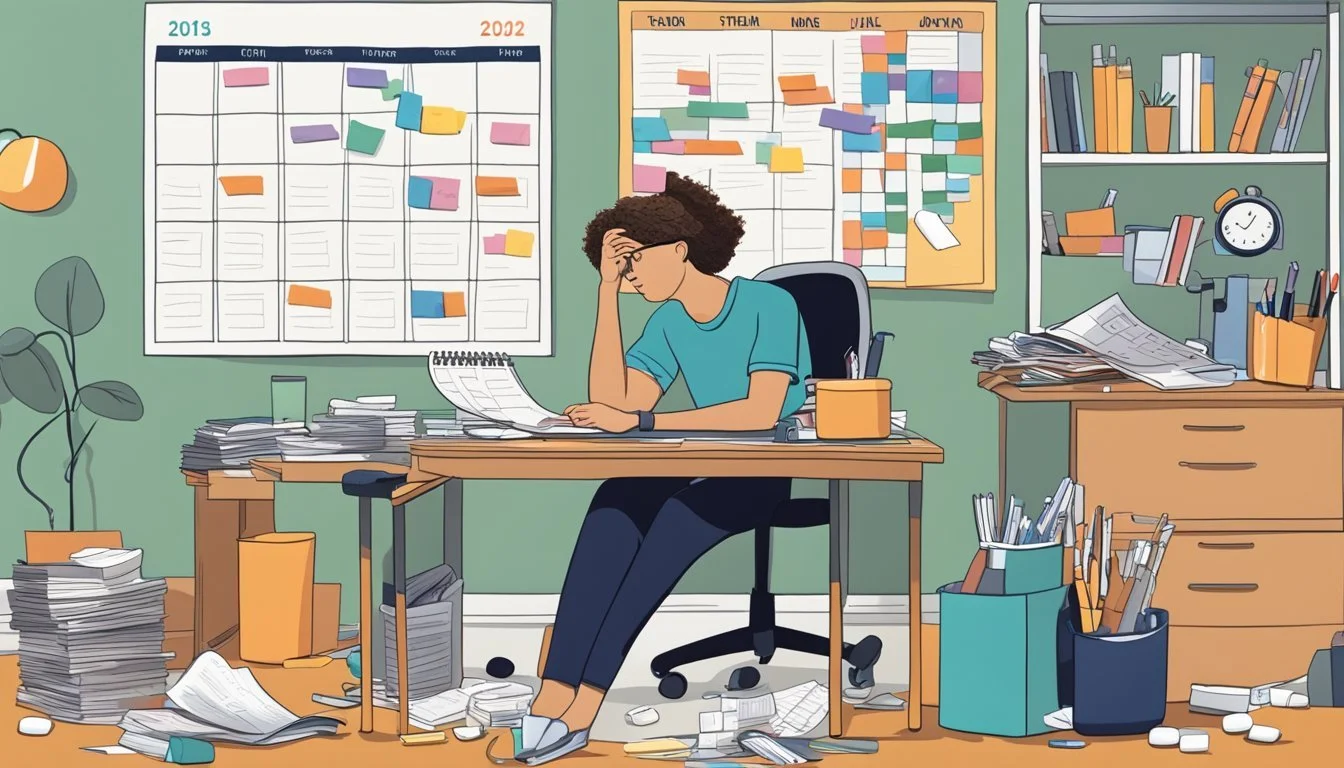11 Strategies for Managing Depression-Related Procrastination
Effective Tools for Overcoming Inertia
Depression and procrastination often go hand in hand, creating a challenging cycle that can be difficult to break. Many individuals struggling with depression find themselves postponing tasks and responsibilities, which can further exacerbate their symptoms. This relationship between depression and procrastination can significantly impact one's daily life, work performance, and overall well-being.
Understanding and implementing effective strategies to manage depression-related procrastination can lead to improved mental health and increased productivity. By addressing both the underlying depression and the tendency to procrastinate, individuals can develop healthier coping mechanisms and regain control over their lives. This article explores 11 practical approaches to help those experiencing depression overcome procrastination and move forward with their goals.
1) Break Down Tasks
Large tasks can feel overwhelming when dealing with depression-related procrastination. Breaking them into smaller, manageable steps can make them less daunting.
Start by identifying the main goal or task. Then, divide it into smaller subtasks that can be completed in shorter time frames. This approach makes progress more visible and achievable.
Create a list of these subtasks and prioritize them. Focus on completing one small step at a time rather than fixating on the entire project. This method helps build momentum and a sense of accomplishment.
Set realistic deadlines for each subtask. Be mindful of your energy levels and adjust timelines accordingly. Celebrating small victories along the way can boost motivation and confidence.
Consider using tools like task management apps or a simple notebook to track progress. Visual representation of completed subtasks can provide encouragement and motivation to continue moving forward.
2) Set a Timer
Setting a timer can be an effective strategy for managing depression-related procrastination. This technique, often called the Pomodoro Technique, involves working in focused bursts followed by short breaks.
Choose a task and set a timer for 25 minutes. During this time, concentrate solely on the chosen activity without any distractions. When the timer goes off, take a 5-minute break.
This method helps break tasks into manageable chunks, making them feel less overwhelming. It also provides a sense of structure and accomplishment, which can be particularly beneficial for those struggling with depression.
For individuals with depression, even small periods of focused work can boost motivation and reduce feelings of helplessness. The timer acts as an external cue, helping to overcome the inertia often associated with procrastination.
As one becomes more comfortable with this technique, the work periods can be adjusted. Some people may find 15-minute sessions more manageable, while others might prefer longer 45-minute blocks.
Remember, the goal is to start working, not to finish everything in one session. Consistent, small steps can lead to significant progress over time.
3) Use a Planner
Utilizing a planner can be an effective strategy for managing depression-related procrastination. A planner helps create structure and organization, which can be particularly beneficial for those struggling with depression and task avoidance.
By writing down tasks, appointments, and deadlines, individuals can gain a clearer picture of their responsibilities. This visual representation can make tasks seem more manageable and less overwhelming.
Planners also allow for breaking larger tasks into smaller, more achievable steps. This approach can help reduce feelings of being overwhelmed and increase motivation to start working on tasks.
Setting realistic deadlines in a planner can create a sense of accountability. Seeing these deadlines written down may encourage individuals to take action and complete tasks on time.
Many people find satisfaction in crossing off completed items in their planner. This simple act can provide a sense of accomplishment and boost mood, which is especially important for those dealing with depression.
A planner can also serve as a tool for tracking progress over time. This can be encouraging for individuals with depression, as it provides tangible evidence of their efforts and achievements.
4) Practice Self-Compassion
Self-compassion plays a crucial role in managing depression-related procrastination. It involves treating oneself with kindness and understanding, especially during difficult times.
Individuals can cultivate self-compassion by acknowledging that depression is not a choice. This recognition helps reduce self-blame and fosters a more supportive internal dialogue.
Practicing mindfulness is another effective way to develop self-compassion. It allows people to observe their thoughts and feelings without judgment, creating space for a more compassionate perspective.
When faced with procrastination, individuals can try reversing their perspective. Instead of harsh self-criticism, they can consider how they would speak to a friend in a similar situation.
Taking small steps and celebrating minor achievements can also boost self-compassion. This approach helps build confidence and motivation, counteracting the tendency to procrastinate.
Self-compassion exercises, such as writing kind letters to oneself or using compassionate self-talk, can be powerful tools. These practices help reframe negative self-perceptions and promote a more supportive inner voice.
5) Seek Professional Help
Professional assistance can be invaluable for managing depression-related procrastination. Mental health experts, such as therapists and counselors, are trained to address the complex interplay between depression and procrastination.
These professionals can provide personalized strategies tailored to an individual's specific needs and circumstances. They may employ various therapeutic approaches, including cognitive-behavioral therapy, to help clients identify and modify unhelpful thought patterns and behaviors.
Medication might also be recommended in some cases. Antidepressants can help alleviate depressive symptoms, potentially making it easier to tackle tasks and overcome procrastination tendencies.
Regular therapy sessions offer a supportive environment for exploring underlying issues contributing to procrastination. Therapists can assist in developing coping mechanisms, improving time management skills, and setting achievable goals.
Seeking professional help demonstrates a commitment to self-improvement and can provide the necessary tools and support to break the cycle of depression and procrastination. It's a proactive step towards better mental health and increased productivity.
6) Find an Accountability Partner
Partnering with someone to stay accountable can be an effective strategy for managing depression-related procrastination. An accountability partner provides support, encouragement, and a sense of responsibility to follow through on commitments.
When choosing an accountability partner, consider friends, family members, or colleagues who understand your challenges. Look for someone reliable, supportive, and willing to check in regularly on your progress.
Set up a system for regular check-ins with your partner. This could involve daily text messages, weekly phone calls, or in-person meetings to discuss goals and achievements.
Be specific about your tasks and deadlines when communicating with your accountability partner. Share your plans and ask them to follow up on agreed-upon timeframes.
Reciprocate by offering support to your partner if they also struggle with procrastination. This mutual exchange can strengthen your commitment and motivation.
Consider joining online communities or support groups focused on overcoming procrastination. These platforms can connect you with potential accountability partners who share similar goals.
Remember that an accountability partner is there to support, not judge. Choose someone who will offer constructive feedback and encouragement, helping you stay on track with your tasks and goals.
7) Utilize Medication When Necessary
Medication can play a crucial role in managing depression-related procrastination for some individuals. Antidepressants, when prescribed by a healthcare professional, may help alleviate depressive symptoms that contribute to procrastination.
A 2023 study found that antidepressant treatment significantly reduced depression symptoms and increased workplace productivity over six months in patients with Major Depressive Disorder. This suggests that medication can potentially address procrastination indirectly by targeting underlying depression.
Common antidepressants include selective serotonin reuptake inhibitors (SSRIs), serotonin-norepinephrine reuptake inhibitors (SNRIs), and atypical antidepressants. These medications work by balancing brain chemicals associated with mood regulation.
It's important to note that medication is not a standalone solution. Combining pharmacological treatment with therapy and lifestyle changes often yields the best results. Patients should work closely with their healthcare providers to find the most effective medication and dosage.
Regular follow-ups and open communication about side effects and progress are essential. Medication may need adjustments over time to maintain effectiveness and minimize potential side effects.
8) Join Support Groups
Support groups offer a valuable resource for individuals struggling with depression-related procrastination. These groups provide a safe space to connect with others facing similar challenges.
Participants can share their experiences, coping strategies, and insights. This peer-to-peer interaction can help reduce feelings of isolation and foster a sense of community.
Many organizations, such as the Anxiety and Depression Association of America (ADAA), offer online support communities. These platforms allow people to engage in discussions and access helpful resources from the comfort of their homes.
Local in-person support groups may also be available through community centers, healthcare providers, or mental health organizations. These face-to-face meetings can provide more immediate support and personal connections.
Support groups often feature guest speakers or educational components. These elements can introduce new techniques for managing depression and overcoming procrastination.
Regularly attending support group meetings can help maintain motivation and accountability. Members often set goals and report back on their progress, encouraging continued effort in managing symptoms.
9) Try Cognitive Behavioral Therapy
Cognitive Behavioral Therapy (CBT) is a powerful tool for addressing depression-related procrastination. This therapeutic approach focuses on identifying and changing negative thought patterns and behaviors that contribute to procrastination.
CBT helps individuals recognize the connection between their thoughts, feelings, and actions. By examining these relationships, people can develop strategies to overcome procrastination habits.
During CBT sessions, a therapist may guide clients to challenge irrational beliefs about tasks or their abilities. This process can lead to more realistic and productive thinking patterns.
CBT also emphasizes the importance of setting achievable goals and breaking larger tasks into smaller, manageable steps. This approach can make overwhelming projects feel less daunting and more approachable.
Studies have shown that CBT can be effective in reducing procrastination and improving productivity. It can also help alleviate symptoms of depression, addressing both issues simultaneously.
While CBT is typically conducted with a trained therapist, some of its principles can be applied independently. Self-help books and online resources can provide valuable CBT techniques for managing procrastination.
10) Engage in Physical Activity
Physical activity can be a powerful tool in managing depression-related procrastination. Regular exercise has been shown to boost mood, reduce stress, and increase energy levels.
Even short bursts of activity can make a difference. A brisk 10-minute walk or some quick stretches can help break the cycle of procrastination and improve focus.
For maximum benefits, aim for at least 150 minutes of moderate-intensity aerobic activity per week. This could include activities like jogging, cycling, or swimming.
Strength training exercises are also valuable. Try incorporating bodyweight exercises or light weightlifting into your routine at least twice a week.
Group fitness classes or team sports can provide additional motivation and social support. These activities combine physical exertion with social interaction, which can further combat depressive symptoms.
Remember to start slowly and gradually increase intensity and duration. Consistency is key, so choose activities you enjoy and can maintain long-term.
11) Prioritize Self-Care
Self-care is crucial for managing depression-related procrastination. Engaging in activities that promote physical and mental well-being can boost mood and energy levels, making it easier to tackle tasks.
Regular exercise is a powerful tool for combating depression and procrastination. Even short bursts of physical activity can release endorphins, improving overall mood and motivation.
Adequate sleep is essential for cognitive function and emotional regulation. Establishing a consistent sleep schedule and creating a relaxing bedtime routine can improve sleep quality and daytime functioning.
Maintaining a balanced diet provides the body with necessary nutrients for optimal brain function. Eating regular, nutritious meals can help stabilize mood and energy levels throughout the day.
Mindfulness practices, such as meditation or deep breathing exercises, can reduce stress and increase focus. These techniques can help individuals stay present and engaged with their tasks.
Engaging in enjoyable hobbies or creative activities can provide a sense of accomplishment and boost self-esteem. Setting aside time for these pursuits can serve as a reward for completing necessary tasks.
Understanding Procrastination and Depression
Depression and procrastination are closely intertwined, with one often exacerbating the other. Their connection stems from complex psychological factors that impact motivation, focus, and task completion.
The Connection Between Depression and Procrastination
Depression can lead to a lack of energy and interest in daily activities, making it challenging to start or finish tasks. This often results in procrastination, which in turn can worsen depressive symptoms.
People with depression may struggle with concentration and decision-making, further contributing to procrastination. The negative self-talk associated with depression can also fuel avoidance behaviors.
Procrastination can serve as a short-term coping mechanism for depressed individuals, providing temporary relief from negative emotions. However, this avoidance strategy ultimately reinforces depressive patterns.
Psychological Reasons Behind Procrastination
Several psychological factors contribute to procrastination in depressed individuals:
Low self-esteem and self-doubt
Fear of failure or perfectionism
Difficulty regulating emotions
Impaired executive functioning
Ruminative thinking, common in depression, can trap individuals in cycles of negative thoughts, making it hard to initiate action. Mindfulness deficits may also play a role, as depressed individuals struggle to stay present and engaged.
Cognitive distortions, such as catastrophizing or all-or-nothing thinking, can magnify perceived task difficulty and decrease motivation. These distorted thought patterns can lead to task avoidance and procrastination.
Practical Strategies for Managing Procrastination
Setting achievable goals and establishing a structured routine are key tactics for overcoming procrastination linked to depression. These approaches provide direction and stability, helping to break the cycle of inaction.
Setting Manageable Goals
Break large tasks into smaller, more digestible steps. This reduces feelings of overwhelm and makes progress more visible. Set specific, measurable goals with clear deadlines. For example, instead of "clean the house," aim to "vacuum the living room by 3 PM."
Use the SMART criteria for goal-setting:
Specific
Measurable
Achievable
Relevant
Time-bound
Prioritize tasks based on importance and urgency. Focus on completing one small goal at a time to build momentum and confidence.
Creating a Structured Routine
Develop a daily schedule that allocates time for work, self-care, and leisure activities. Consistency helps combat the unpredictability often associated with depression.
Start with a morning routine to set a positive tone for the day. This might include:
Waking up at the same time
Light exercise or stretching
Healthy breakfast
Brief meditation or mindfulness practice
Use time-blocking techniques to dedicate specific periods for different tasks. Include regular breaks to prevent burnout and maintain focus.
Implement the "2-minute rule": if a task takes less than 2 minutes, do it immediately. This prevents small tasks from piling up and becoming overwhelming.
Tools and Resources for Support
Various tools and resources can provide valuable support for managing depression-related procrastination. These range from professional therapy options to technological aids designed to boost productivity and mental well-being.
Therapy and Counseling Options
Cognitive Behavioral Therapy (CBT) is a highly effective treatment for depression and procrastination. It helps individuals identify and change negative thought patterns and behaviors. Many therapists now offer online sessions, making treatment more accessible.
Support groups, both in-person and virtual, provide a space to share experiences and coping strategies with others facing similar challenges. These groups can offer emotional support and practical tips.
Mindfulness-based therapies, such as Acceptance and Commitment Therapy (ACT), teach skills to manage difficult emotions and increase psychological flexibility. These approaches can be particularly helpful for those struggling with depression-related procrastination.
Apps and Technology Aids
Productivity apps like Todoist and Trello help break tasks into manageable steps and set reminders. These tools can make overwhelming projects feel more approachable.
Mood tracking apps such as Daylio and MoodKit allow users to monitor their emotional state and identify patterns. This awareness can help individuals recognize when they're more likely to procrastinate due to depression.
Meditation and mindfulness apps like Headspace and Calm offer guided exercises to reduce stress and improve focus. Regular use of these apps can help manage symptoms of depression and increase motivation.
Pomodoro timer apps encourage focused work sessions followed by short breaks. This technique can be especially useful for those who struggle with concentration due to depression.









